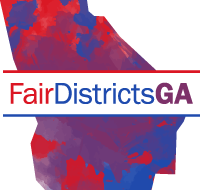Gerrymandering in Georgia
Gerrymandering:
explained in less than 2 minutes:
How has gerrymandering affected Georgia?
The Georgia Constitution mandates that our legislature redistrict every 10 years following the national Census. It also allows for annual redistricting which means Georgia lawmakers can change district lines during any legislative session.
Georgia lawmakers of both political parties have used these opportunities to engage in creative mapmaking to protect incumbents or weaken political opponents. Andrew Young, Newt Gingrich, and John Barrow were all purposely drawn out of their home districts during their respective bids for Congress.
In 2015, GOP legislators changed district lines for House Districts 105 and 111 to protect two Republican representatives who had barely won re-election the year before. Attempts to do the same in other districts in 2017 and 2019 were ultimately shelved thanks to intense public scrutiny.
The rise of sophisticated mapping technology has made gerrymandering easier and more effective than ever. In 2016, Georgia’s legislative races were the least competitive in the country with 81% of legislative seats going uncontested as a result of partisan gerrymandering.
Non-competitive, “safe” districts not only rob voters of their Constitutional right to elect their own representatives, they cause complacency among lawmakers and lessen the need for elected officials to represent the will of their constituents. Lawmakers have no incentive to work toward bipartisan solutions and representatives with extreme views have an easier time getting elected. Lack of bipartisan collaboration ultimately leads to inefficient and ineffective government.
Gerrymandered districts are also a powerful tool to reduce the power of minority communities. While racial gerrymandering is illegal, minority communities are often "packed" into minority-majority districts, but don’t always receive the benefit of minority leadership when leaders of color are targeted and discouraged from running. Communities of color can also be “cracked,” or broken up into multiple districts, to diffuse their voting power.
What can be done to prevent gerrymandering in Georgia?
There are two ways to change our redistricting process: legal and legislative. While racial gerrymandering is against the law, partisan gerrymandering is legal and rampant in many US states, including Georgia.
In June 2019, the US Supreme Court ruled in a 5-4 decision that federal courts have no power over partisan gerrymandering. In the majority opinion that he wrote, Chief Justice Roberts said "Excessive partisanship in districting leads to results that reasonably seem unjust." However, he also wrote, "We conclude that partisan gerrymandering claims present political questions beyond the reach of the federal courts." (Rucho v. Common Cause, No. 18-422, and Lamone v. Benisek, No. 18-726). While the issue will surely return to the federal courts at some distant future date, as of this decision only state courts can possibly be involved in fights against gerrymandering. Unfortunately, the Georgia Constitution is so vague about voting rights and the characteristics of electoral districts that legal opinion is that Georgia will not see the types of state-level judicial relief that have occurred in Pennsylvania and North Carolina.
While judicial relief is unlikely to be effective here, Georgia can strengthen its current redistricting process with specific legislation passed in the Georgia General Assembly. Our current redistricting process gives lawmakers broad leeway in drawing district lines. Georgia needs to pass an amendment to the Georgia constitution to create an independent citizens' redistricting commission that takes redistricting out of the hands of the partisan legislature and into an independent commission. At least twenty states have created such commissions with a result in more competitive elections. The legislation should also include redistricting guidelines that require a fair, transparent, nonpartisan, and accountable process. The legislation introduced in the Georgia General Assembly with the name the "Democracy Act" provides for all of these solutions to partisan gerrymandering in Georgia.
A major requirement for legislative relief for partisan gerrymandering is the election of legislators to the Georgia General Assembly who have made a commitment to legislative reform. Thus, citizens have a duty to investigate the commitment of candidates to the state house and the state senate and to then hold them to that commitment for reform once they are elected.
At the same time, Georgia can strengthen its current redistricting process with specific legislation. Our current redistricting process gives lawmakers broad leeway in drawing district lines. Georgia could also pass a Constitutional amendment to create an independent nonpartisan redistricting commission that takes redistricting out of the hands of the partisan legislature and into an independent committee. Twenty states have created such committees which have resulted in more competitive elections. The legislature can also pass stronger redistricting guidelines that require a fair, nonpartisan, transparent and accountable process. Both of these legislative solutions have been introduced in the Georgia House and Senate, but have yet to come to a vote in their respective redistricting committees. Fair Districts GA supports both of these legislative solutions to improve our redistricting process but believes the ultimate solution lies in an independent redistricting commission.
What can I do to help?
Because the GA legislature has no compelling reason to change the process, redistricting reform will only happen when politicians realize that citizens are paying close attention and demanding meaningful reform. Your efforts will not only have an impact, it is the only way foreseeable way that reform will happen.
You can vote for legislators who are committed to redistricting reform. You can work for greater participation of Georgians in elections. You can make sure that members of the Georgia General Assembly know that you are paying attention and will not support self-serving gerrymandering. Get involved!
